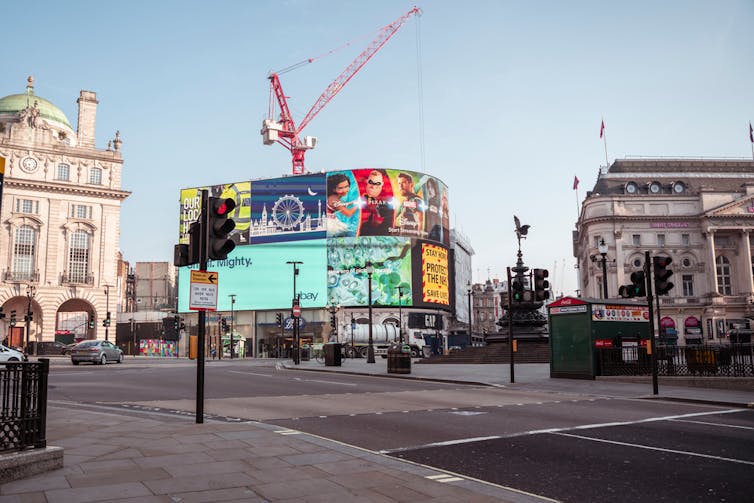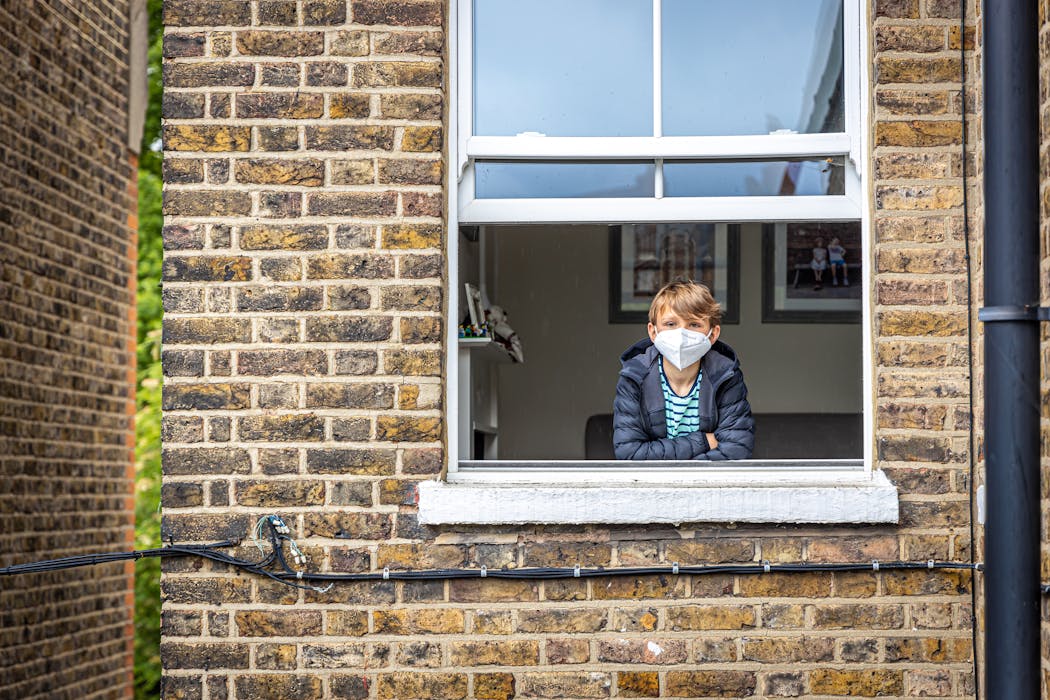- Home
Edition
Africa Australia Brasil Canada Canada (français) España Europe France Global Indonesia New Zealand United Kingdom United States Edition:
Global
Edition:
Global
- Africa
- Australia
- Brasil
- Canada
- Canada (français)
- España
- Europe
- France
- Indonesia
- New Zealand
- United Kingdom
- United States
 Academic rigour, journalistic flair
Academic rigour, journalistic flair
 Alexey Fedorenko/Shutterstock.com
Inquiry says COVID lockdowns could have been avoided – they’re right
Published: November 24, 2025 4.35pm GMT
Mark Woolhouse, University of Edinburgh
Alexey Fedorenko/Shutterstock.com
Inquiry says COVID lockdowns could have been avoided – they’re right
Published: November 24, 2025 4.35pm GMT
Mark Woolhouse, University of Edinburgh
Author
-
 Mark Woolhouse
Mark Woolhouse
Professor of Infectious Disease Epidemiology, University of Edinburgh
Disclosure statement
Mark Woolhouse holds grants from the European Union and the Wellcome Trust. He was previously a member of the UK's advisory group on modelling SPI-M-O, the Scottish Government's Covid-19 Advisory Group and Standing Committee on Pandemic Preparedness. He has been a consultant for the Coalition for Epidemic Preparedness. He wrote a book on the pandemic response, The Year The World Went Mad (Sandstone Press, 2022), which has been entered into evidence by the UK Covid Inquiry.
Partners
The University of Edinburgh provides funding as a member of The Conversation UK.
View all partners
DOI
https://doi.org/10.64628/AB.ujaghqvnq
https://theconversation.com/inquiry-says-covid-lockdowns-could-have-been-avoided-theyre-right-269827 https://theconversation.com/inquiry-says-covid-lockdowns-could-have-been-avoided-theyre-right-269827 Link copied Share articleShare article
Copy link Email Bluesky Facebook WhatsApp Messenger LinkedIn X (Twitter)Print article
The UK was one of the most locked down countries in the world during the COVID pandemic, but this was not inevitable – it was a failure of public health policy.
That should be the lasting legacy of the UK COVID inquiry’s latest report, not a critique of politicians no longer in office.
In a public health emergency, saving lives will always be the first priority, but even as COVID raged, it was never a binary choice between harsher restrictions or more deaths. The choice was between different ways to protect people from a dangerous virus.
In 2020, governments that had never previously contemplated lockdowns imposed them anyway. On March 23, the UK population was ordered to stay at home, without any assessment of how much harm this would do to the economy, education, access to healthcare and the wellbeing of everyone – especially children.
The vast scale of the resulting damage shows why avoiding lockdowns must be a priority for policymakers in future pandemics.
I gave evidence to that effect to the COVID inquiry myself. I also listened to testimony from politicians, officials, doctors and epidemiologists. But I heard surprisingly little about how COVID could have been tackled without lockdowns, even though everyone has had years to reflect on this question.
Instead, witness after witness argued that the problem with the March 2020 lockdown was that it came too late. Matt Hancock, the UK’s then health minister, thought it should have come three weeks earlier, but one week was the majority view.
So, the inquiry was justified in making that point in their report. Backing it up with the claim, based on a mathematical model, that it would have saved more than 20,000 lives is more contentious. Historians distrust counterfactuals, and it makes no difference if one is expressed in equations rather than words.
Despite making that claim, the inquiry doesn’t like lockdowns. “Far from it,” said the inquiry’s chair, Baroness Hallett, when she introduced her report. She explained that if action had been taken earlier, then lockdowns “might not have been necessary at all”.
That’s correct: earlier action can be less drastic action. There is no need for draconian measures intended to drive down the number of cases if you don’t let them rise in the first place.
 The UK was one of the most locked down countries in the world.
Jam Travels/Shutterstock.com
The UK was one of the most locked down countries in the world.
Jam Travels/Shutterstock.com
More moderate precautions from respiratory hygiene to self-isolation of people with COVID were enough to keep essential services going, even to make professional sports possible, long before there were vaccines. Next time, basic interventions must be identified more quickly, and rolled out faster and wider than they were in 2020.
The inquiry’s report also concludes that more should have been done to protect those most vulnerable to COVID: the elderly, frail and infirm. This should have been the priority throughout, but it was overshadowed by lockdown — a strategy that did not do enough to protect care home residents, who faced far greater risks than the children no longer able to go to school.
“Cocooning”, ensuring those around them are virus free, is the most effective way of protecting the vulnerable. The cumbersome PCR tests used early in the pandemic were not ideal for this purpose. Lateral flow devices were far better, yet this straightforward technology was not largely deployed for almost two years.
When advisers stop offering alternatives
The next pandemic may be different from COVID, so more generic lessons must be learned too. The most pressing one is why it took so long to intervene effectively, with February 2020 described as a “lost month”.
The inquiry concluded that the quality of the UK’s political leadership was a major barrier, but when the next pandemic arrives, it will again be a case of whoever is in the hot seat. Other considerations are more controllable.
Much better preparedness planning, real-time data collection, and competent public health agencies are all important. So are more resilient national health services, though their current state makes that harder to deliver.
Then there is the approach to giving scientific advice. I write as a former member of COVID advisory committees to the UK and Scottish governments, and the inquiry report describes my attempts to push for strong and urgent action from mid-January 2020. That I failed is no surprise; throughout that period, the UK’s highest-level advisory committee, Sage, was not conveying the same sense of urgency, to the despair of some of its own members.
As the pandemic progressed, there were repeated tensions between a government that did not want to go back into lockdown and advisers who were now reluctant to suggest anything else. I heard senior scientists tell the inquiry that the test, trace and isolate scheme had limited potential, that cocooning was too difficult, mass testing would not deliver, and localised restrictions were insufficient.
The few witnesses who rejected this counsel of despair were in a clear minority. Yet all these interventions succeeded at other times or places.
Given what it had been told, the best the inquiry could do was endorse an abbreviated form of lockdown called a circuit-breaker; it was all that was left on the table. The COVID pandemic might have played out differently if advisers had engaged more constructively with alternatives to lockdown at the time.
This matters because policy should be informed by science but not driven by scientific advisers presenting limited options. It’s patronising to act as though policymakers will be paralysed into inaction if they hear more than one idea. Yet a senior adviser told the inquiry that advisers should “err on the side of giving unequivocal advice earlier”.
Buried deep in the report are two recommendations that point in the opposite direction. First, advisory committees should be more diverse and entertain a wider range of views. Second, they should seek to give the government options.
Last week’s COVID inquiry report fuels a vital debate that was difficult to have in 2020, even among advisers. If that makes lockdowns less likely when the next pandemic arrives, then the exercise will have been worthwhile.
- COVID-19
- COVID lockdowns
- Give me perspective
- UK Covid Inquiry
Events
Jobs
-
 Analyst, Student Information and Regulatory Reporting
Analyst, Student Information and Regulatory Reporting
-
 Lecturer in Paramedicine
Lecturer in Paramedicine
-
 Associate Lecturer, Social Work
Associate Lecturer, Social Work
-
 Lecturer, Communication Design
Lecturer, Communication Design
-
 Leading Research Centre Coordinator
Leading Research Centre Coordinator
- Editorial Policies
- Community standards
- Republishing guidelines
- Analytics
- Our feeds
- Get newsletter
- Who we are
- Our charter
- Our team
- Partners and funders
- Resource for media
- Contact us
-
-
-
-
Copyright © 2010–2025, The Conversation

 Analyst, Student Information and Regulatory Reporting
Analyst, Student Information and Regulatory Reporting
 Lecturer in Paramedicine
Lecturer in Paramedicine
 Associate Lecturer, Social Work
Associate Lecturer, Social Work
 Lecturer, Communication Design
Lecturer, Communication Design
 Leading Research Centre Coordinator
Leading Research Centre Coordinator


